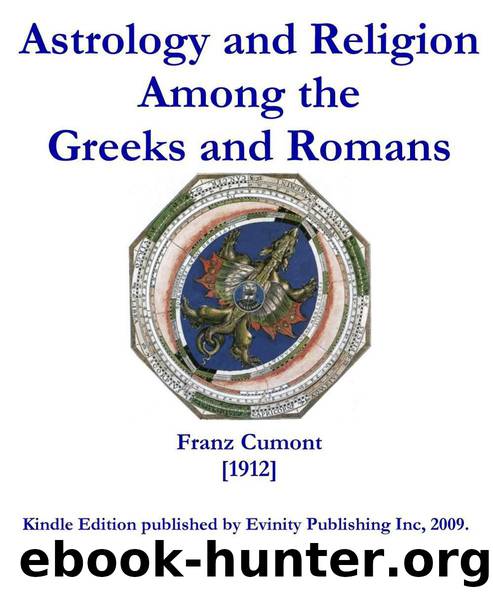Astrology and Religion Among the Greeks and Romans by Cumont Franz

Author:Cumont, Franz [Cumont, Franz]
Language: eng
Format: epub, mobi
Publisher: Evinity Publishing Inc
Published: 2009-04-25T04:00:00+00:00
[p. 54]
principle of the sovereignty of the people, the original form of Cæsarism, was substituted a reasoned belief in supernatural influences. The emperor is the image of the Sun on earth, like him invincible and eternal (invictus, aeternus), as his official title declares. Already in the eyes of the Babylonians the Sun was the royal planet, and it is he that in Rome continues to give to his chosen ones the virtues of sovereignty, and destines them for the throne from the time of their appearance on earth. He remains in close communion with them, he is their companion (comes) and their congener, for they are united by community of nature. It may be said that they are consubstantial; and in the third century the monarch was worshipped as "god and master by right of birth" (deus et dominus natus), who had descended from heaven by grace of the Sun, and by his grace will reascend thither again after death. The idea that the monarch's soul, at the moment when destiny caused it to descend to this world, received from the Star of the day its sovereign power, led to the inference that he participated in the might of this divinity, and was its representative on earth. Thus it is noticeable that the princes who proclaimed most loudly their autocratic pretensions, a Domitian or a Commodus, were also those who most openly favoured Oriental cults.
These cults attained the zenith of their power when the advent of the Severi brought them the support of a half-Syrian Court. For nearly half a century, from A.D. 193 to 235, the Empire was governed by a family of Emesa, an ancient sacerdotal state, where on the edge of the Syrian desert rose the splendid temple of Elagabalus. Intelligent and ambitious princesses, Julia Domna, Sohæmias, Mæsa, and Mammæa, whose intellectual ascendancy was so considerable, became missionaries of their national religion. Officials of all ranks, senators and officers, rivalled each other in devotion to the gods who protected their sovereigns and were protected by them. You all know the bold proclamation of A.D. 218 which set upon the throne a boy of fourteen years, priest of Elagabalus, whose name he bore. The Greeks named him Heliogabalus in order to recall the solar character of this god. To this barbarous divinity, hitherto rather obscure, he sought to give the primacy
Download
Astrology and Religion Among the Greeks and Romans by Cumont Franz.mobi
This site does not store any files on its server. We only index and link to content provided by other sites. Please contact the content providers to delete copyright contents if any and email us, we'll remove relevant links or contents immediately.
Becoming Supernatural by Dr. Joe Dispenza(7108)
Tools of Titans by Timothy Ferriss(6950)
The Witchcraft of Salem Village by Shirley Jackson(6586)
Inner Engineering: A Yogi's Guide to Joy by Sadhguru(5897)
The Four Agreements by Don Miguel Ruiz(5511)
The Power of Now: A Guide to Spiritual Enlightenment by Eckhart Tolle(4757)
The Wisdom of Sundays by Oprah Winfrey(4627)
Room 212 by Kate Stewart(4108)
Fear by Osho(4085)
Pale Blue Dot by Carl Sagan(4006)
The David Icke Guide to the Global Conspiracy (and how to end it) by David Icke(3884)
Rising Strong by Brene Brown(3783)
Animal Frequency by Melissa Alvarez(3755)
How to Change Your Mind by Michael Pollan(3679)
Sigil Witchery by Laura Tempest Zakroff(3653)
Real Magic by Dean Radin PhD(3569)
Secrets of Antigravity Propulsion: Tesla, UFOs, and Classified Aerospace Technology by Ph.D. Paul A. Laviolette(3455)
The Art of Happiness by The Dalai Lama(3385)
Man and His Symbols by Carl Gustav Jung(3319)
